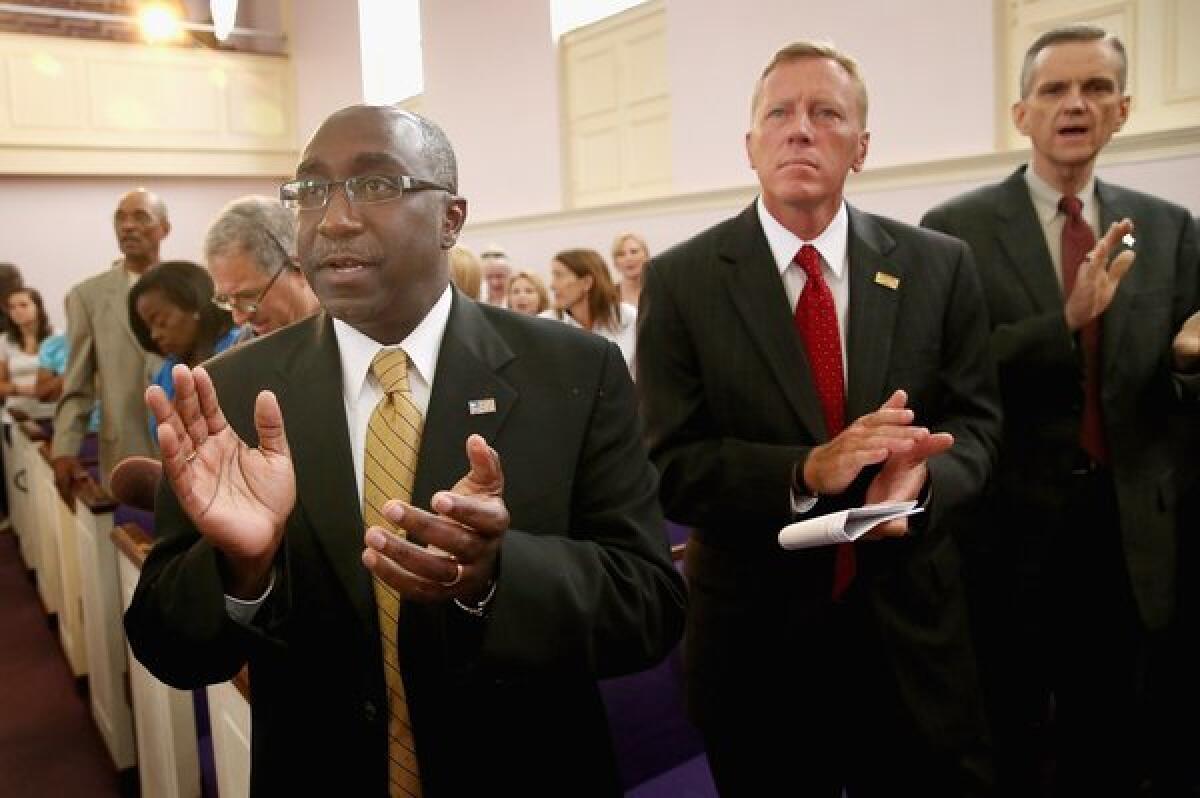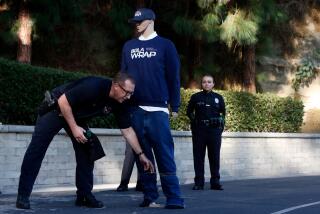Florida city seeks to disarm watch volunteers like George Zimmerman

- Share via
The police chief in Sanford, Fla., the city made famous by the confrontation between George Zimmerman and an unarmed teenager, is moving to disarm neighborhood watch volunteers, ban them from pursuing suspects and conduct background checks as part of a major overhaul of the program.
Zimmerman, who was a neighborhood watch volunteer, was acquitted in July of second-degree murder in the shooting of Trayvon Martin on Feb. 26, 2012. The case roiled racial tensions and prompted questions about the role of guns. The new rules will be formally released at a community meeting Nov. 5.
Police Chief Cecil Smith, who took over in April, told reporters this week that the city’s neighborhood watch program during the period that Zimmerman was involved was dysfunctional and had no accountability.
“In this program, it is clearly stated that you will not pursue an individual,” Smith explained. “In this new program, it clearly indicates that you will not carry a firearm when performing your duties as a neighborhood watch captain or participant.”
“There was really no accountability. There was no true recognition. There were concerns with regards to training. There were concerns with how the program was being run,” Smith said. “We put a cease to the neighborhood watch program, essentially, in the manner it was in before, and what we’re doing now is really, truly revamping the entire program, starting from scratch.”
In addition to the ban on guns and following suspects, the new neighborhood watch program in Sanford will include mandatory background checks. Designated block captains will have direct lines of communication with a new division of officers created to work with neighborhood watch members. Before the new rules, a civilian was the liaison between police and watch volunteers, Smith said.
Smith said the new program is really just getting back to the basics of what neighborhood watch is supposed to be.
“Neighborhood watch is a very simple organization. It’s about neighbors helping neighbors, talking to neighbors about ways to make their neighborhood safe. That’s it,” Smith said. “Again, do I think I’m going to make every person happy about our requirements that you don’t be armed? I’m not going to make everyone happy, but not everyone has to be part of the program.”
The line between citizen participation and the dangers of untrained individuals wanting to play police has been a concern ever since the modern neighborhood watch movement had its birth after the rape and murder of Kitty Genovese in Queens, N.Y., in the 1960s. Residents heard her screams and did nothing to help. The case, which highlighted community apathy, sparked outrage. Eventually, some law enforcement groups sponsored efforts to bring citizens more closely into the process, establishing tip lines, ride-alongs and eventually citizen patrols.
At the time of the shooting, Zimmerman had been a member of a neighborhood watch group, though he said he was not on patrol the night of his confrontation with Martin at a gated community named The Retreat at Twin Lakes. Martin was visiting a family friend and had taken a break to go to a convenience store where he had purchased a drink and a bag of candy. Martin was walking home when Zimmerman said he saw the teenager.
Prosecutors maintained that Zimmerman had profiled Martin, but Zimmerman told police he saw Martin, wearing a hoodie sweat shirt, became suspicious and followed him. The pair scuffled and Zimmerman said he shot Martin in self-defense, according to Zimmerman’s statements to police entered into evidence at the trial. Zimmerman did not take the stand in his defense. The jury agreed that the shooting was self-defense and acquitted Zimmerman.
At the trial, there was also testimony that a civilian in the Police Department had told neighborhood watch volunteers not to follow suspicious people and were also told to stand aside and allow the police to do their jobs.
Martin’s family eventually filed a wrongful death suit against the subdivision. The suit was settled with the Martin family reportedly receiving at least $1 million.
ALSO:
Four days, 4 massacres, 21 dead
Missing Kansas man who slowly died in car wreck left love letter to family
A ‘horrific scene’ in South Carolina with 6 dead in family feud, sheriff says
More to Read
Sign up for Essential California
The most important California stories and recommendations in your inbox every morning.
You may occasionally receive promotional content from the Los Angeles Times.











